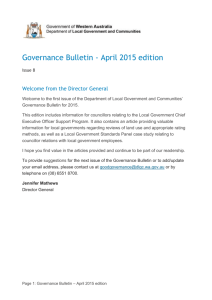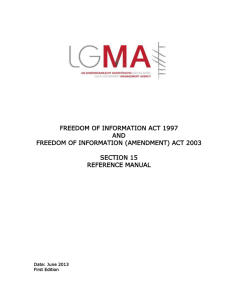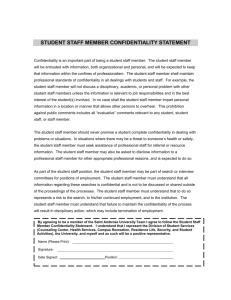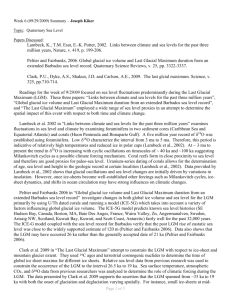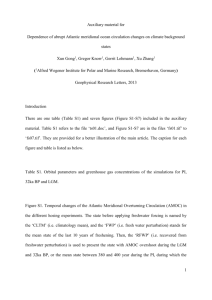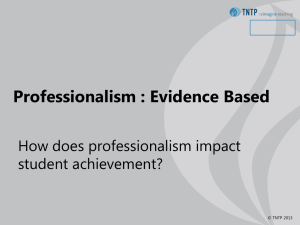Code of Conduct
advertisement
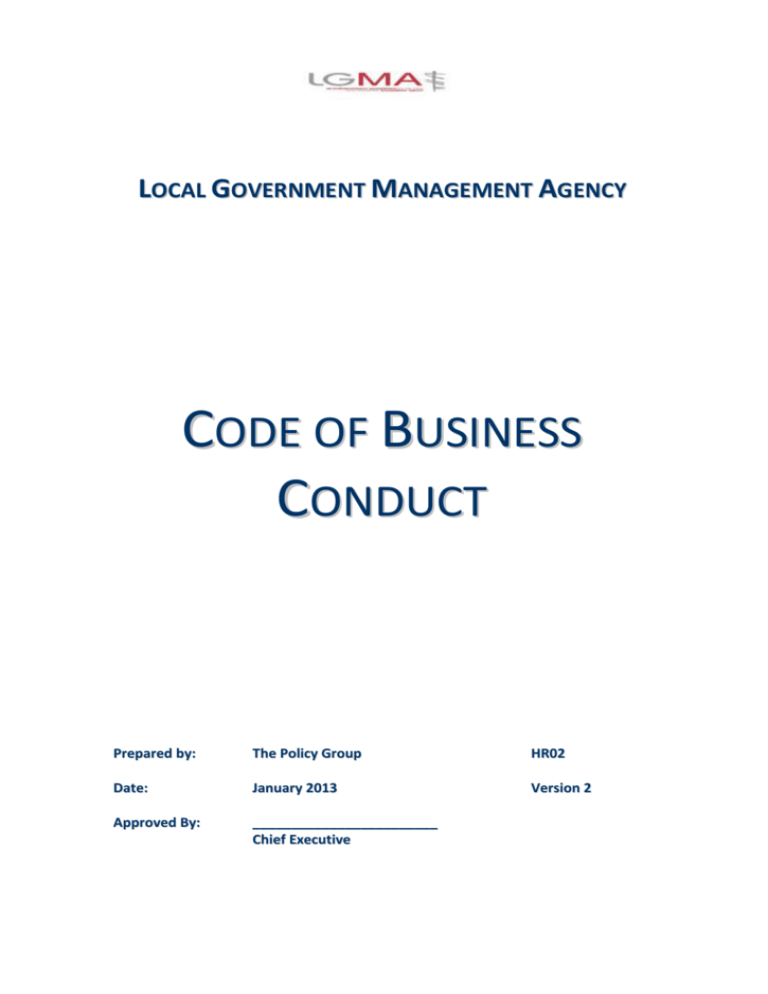
LOCAL GOVERNMENT MANAGEMENT AGENCY CODE OF BUSINESS CONDUCT Prepared by: The Policy Group HR02 Date: January 2013 Version 2 Approved By: ________________________ Chief Executive LGM A CODE OF BUSINESS CONDUCT CODE OF BUSINESS CONDUCT Contents Page Section 1 Chief Executive’s Introduction 2 Section 2 Acknowledgement of Code of Business Conduct 2 Section 3 Objectives 3 Section 4 General Principles 3 1 LGM A CODE OF BUSINESS CONDUCT LOCAL GOVERNMENT MANAGEMENT AGENCY CODE OF CONDUCT 1. Chief Executive’s Introduction The Department of Finance Code of Practice for the Governance of State Bodies requires all State bodies to have written Codes of Business Conduct for Agency members and employees. Under this Code, the Chairman of the Local Government Management Agency (LGMA) is required each year, to confirm to the Minister for Environment, Community & Local Government that a Code of Business Conduct for LGMA Board members and employees is in place, is being adhered to and that appropriate procedures and controls are in place. The Code of Business Conduct adopted by the LGMA primarily governs Agency activities but also provides clear guidance to Board members and employees of the LGMA in relation to the basic principles of integrity, confidentially, professionalism, lawfulness/compliance, loyalty and fairness. The LGMA Code provides guidance in ethical principles relating to conflict of interest, limits on outside activities, acceptance of gifts and honesty in dealings. The Code is complementary to other procedures, policies, rules and regulations already in operation in the LGMA including those relating to conditions of employment, attendance, sick leave, annual leave etc., and it does not affect legislative obligations underpinning employment or other compliance requirements e.g. Equality Act, Ethics in Public Office Acts, Data Protection Acts etc. The Code applies to all LGMA Board members and employees (whether employed on a permanent, temporary, part-time basis or on work experience of any kind). The Code is reviewed on a regular basis. While it is not possible for a set of rules or guidelines to provide for all situations which may arise, members and employees are expected to ensure that all their activities are governed by ethical standards reflected or implicit in this document and those on which it is based, including inter alia, the Ethics Acts 1995 and 2001 and the Code of Practice for the Governance of State Bodies 2001 and 2009. Paul McSweeney Chief Executive - Local Government Management Agency 2 LGM A 2. CODE OF BUSINESS CONDUCT Acknowledgement of Code of Business Conduct Each Agency member and employee is required to acknowledge receipt of the Code of Business Conduct and to sign a declaration of understanding set out on the final page of this document. 3. Objectives The objectives of the Code of Business Conduct are: To strengthen our commitment to the highest standards of business conduct. To promote and maintain stakeholder confidence and trust. To ensure the highest standard of compliance with the Code. 4. General Principles The General Principles embraced by the Code include: Integrity Integrity involves the inherent knowledge of right and wrong and the adherence to generally accepted moral principals. The Agency is totally committed to the concept of integrity in all its dealings. It follows therefore that members and employees conduct themselves and are seen to conduct all activities to the highest possible standard. It includes the following: Disclosure by Agency members of outside business interests in conflict or potential conflict with the business of the Agency. Outside business interests of employees in conflict or potential conflict with the business of the Agency are prohibited. Maintenance of the confidentiality and security of any restricted or confidential information or not using such information for personal gain or abuse of one’s position in any way. Drawing only official remuneration in respect of official activities; refraining from giving or receiving corporate gifts, hospitality, preferential treatment or benefits which might affect or appear to affect the ability of the donor or the recipient to make independent judgement on business transactions. Refraining from using the Agency’s reputation or resources for personal gain, or the benefit of persons/organisations unconnected with the Agency and avoiding outside activities or influences which conflict with or impair work performance in any way. Commitment to act in the best interests of the Agency in all dealings with external agencies, but also ethically and honestly. Purchasing goods/services in accordance with best business practice. Ensuring a culture of claiming expenses only as appropriate to business needs and in accordance with good practice in the public sector generally. 3 LGM A CODE OF BUSINESS CONDUCT Ensuring that Agency accounts accurately reflect business performance and are not misleading or designed to be misleading. Confidentiality Confidentiality means respecting and protecting the privacy of the Agency’s affairs and activities. Board members and Agency employees support the provision of access by the Agency to general information relating to Agency activities in a way that is open and enhances its accountability to the general public. It includes: Non-disclosure of any restricted or confidential information. Confidential information includes: i. Commercially sensitive information (including, but not limited to, future plans or details of major organisational or other changes such as restructuring) ii. Personal Information iii. Information received in confidence from another public body Safeguarding commercially sensitive and personal information held by the Agency in confidence Exercising care in the storage of mail, documents, and the disposal of records either electronic or paper. Seeking approval from the Chief Executive prior to publishing information to the media, and also seeking approval from the Chief Executive for all lectures, articles, letters or books relating to or potentially relating to the affairs of the Agency. Complying with relevant statutory provisions including, where applicable, the Data Protection Act and Freedom of Information Act. Consulting with relevant third parties where, in exceptional circumstances, it is proposed to release sensitive information in the public interest. Lawfulness Lawfulness means always acting within the laws of the State and complying with published regulatory codes of relevance to the Agency. It covers the following: Fulfilling all regulatory and statutory obligations imposed on the Agency. Complying with detailed tendering and purchasing procedures as well as complying with prescribed levels of authority for sanctioning any relevant expenditure. Adhering to procedures laid down by the Agency from time to time and in particular, as they relate to the reimbursement of expenses. Conforming with procedures laid down by the Agency in relation to conflict of interest situations, including the acceptance of positions following employment 4 LGM A CODE OF BUSINESS CONDUCT and/or engagement by a State body that may give rise to the potential for conflicts of interest and to confidentiality concerns. Ensuring insofar as possible that any business venture or transaction which is at variance with legal or regulatory requirements or which might be associated or regarded as supportive of illegal or criminal activities is not entered into on behalf of the Agency. Promoting and preserving the safety regulations and the health and safety of members and employees of the Agency. Professionalism Professionalism can be defined as striving for excellence in all dealings on behalf of the Agency. The standards of the services which the Agency provides rely heavily on a personal approach and the contribution of each individual member and employee. The Agency complies with employment equality and equal status legislation and is committed to fairness in all business dealings. Discrimination of any form including gender, marital status, family status, age, sexual orientation, disability, race, creed or membership of the travelling community is not tolerated. LGMA professionalism embraces the following: Respecting the dignity of clients and colleagues alike. Being courteous at all times. Avoiding unfair treatment of clients/customers and colleagues. Adhering to a culture of professionalism as it relates to dress and personal hygiene. Compliance with technical and professional standards pertaining to the position held. Loyalty Loyalty implies being faithful to the Agency and its clients. It includes: Protecting the good name of the Agency. Being fully committed in all the Agency’s business activities and to fairness in their execution. Acknowledging the duty of all to conform to the highest standards of business ethics and to fairness in their execution. Considering the impact of business decisions on community and environment. 5 LGM A CODE OF BUSINESS CONDUCT I have read and understood the Code of Business Conduct and agree to be bound by the principals set out in any dealing for or on behalf of the Local Government Management Agency. Signed: ______________________ Date: ______________________ 6 LGM A CODE OF BUSINESS CONDUCT Version Control Date 23/1/13 Author S O’Toole Version 2 Change Reference Document Properties Item Document Title Authors Creation Date Last Updated Details Code of Business Conduct The Policy Group May 2011 Jan 2013 Document Location Human Resources/Merger/LGMA Policies & Procedures/Joint Partnership Group Policies Reviewed/HR02_LGMA Code of Business Conduct Version 2 The Policy Group; Anne Monaghan Barbara Richardson Jane Brophy Deirdre Mulvenny Gareth Wills It is hereby acknowledged that a substantial amount of work in the review of the Policies & Procedures was undertaken by the Joint Partnership Review Group, namely; Aileen Byrne David Conway Geraldine Browne Michelle Robinson 7
